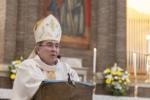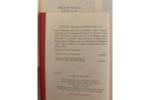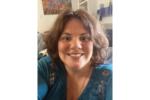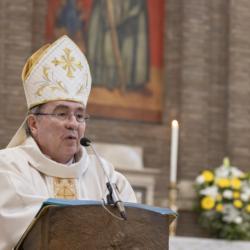Committee hears testimony on stem-cell bill
BEACON HILL — “Life starts as an embryo, even plants — plants and people and animals, they start out as embryos,” 9-year-old Austin Taylor, who suffers from muscular dystrophy, testified on Feb. 16 at a Statehouse committee hearing for a new bill encouraging embryonic stem-cell research sponsored by Senate President Robert E. Travaglini, D-Boston.
"It would be killing a human being, and I don't think it's right," he added.
Austin, his parents and younger brother, Cameron, of Cummington, all spoke out against the proposed bill. They waited over five hours for the committee to hear them. The boys ran back and forth at one end of the courtroom, making a game of their Statehouse visit as they smiled and laughed quietly. Austin looked like any other rowdy boy his age, except that he walked slower and somewhat more stiffly and at times was seated in a wheelchair.
His parents, Michelle and Robert, told the story of a boy who needs a lot of help from trained professionals just to go to school, a boy suffering from a hereditary disease characterized by progressive wasting of muscles that would likely put him in a wheelchair full-time in a year or two.
"We know what it's like. We know about his future -- there's no treatment, no cure," said Robert.
But both Robert and Michelle pleaded with the committee, asking them not to kill another innocent life, a human embryo in order to search for a cure. Robert maintained that society must protect the dignity of every human life. Michelle said she was much more encouraged by other avenues such as adult stem-cell research, which holds more promise for improving her son’s physical condition.
Speaking to The Pilot after the hearing, Michelle said that her family came to testify because they understand the consequences of living with a disability but do not support searching for a cure at all costs. She felt it was important for the committee to hear their view.
"There aren't a lot of people who stand up for the embryo," she said.
Throughout the day, lawmakers, scientists and citizens debated the issue of embryonic stem-cell research. Those speaking in support of the new bill said they wanted to support the research in an ethically responsible manner, but those opposed maintained that the research was, by its very nature, immoral.
State Sen. Jack Hart, D-Boston, co-chairman of the joint Economic Development and Emerging Technology Committee, opened the hearing by admitting that embryonic stem-cell research is a “complicated” issue that needs to be examined from all sides — from the health care, economic development, legal and ethical dimensions.
"We owe it to the people of the commonwealth, and it is our responsibility to examine this issue from all of those sides, even, as I said before, just as important the moral side," he said.
"We are faced with an unprecedented opportunity to save lives and help children recover from illness," he added.
Travaglini introduced the bill, and said he felt ethical standards should be based on scientific research, stressing that his bill bans human reproductive cloning.
The bill, however, promotes so-called “therapeutic cloning” often referred to by its technical name: somatic cell nuclear transfer. The procedure is a type of cloning in which an embryo with the same genetic makeup of a patient is created and then destroyed for stem-cells.
In her testimony before the committee, associate director for public policy at the Massachusetts Catholic Conference Maria Parker said that however an embryo is created, it is a human being with a complete genetic code, and that is a “simple, biological fact.”
Killing this human life is morally wrong, she added.
"Science does not have to kill in order to cure," she said.
Father Tadeusz Pacholczyk of the National Catholic Bioethics Center, who holds a doctorate in neuroscience, testified for about an hour. He said that no one should be allowed to create a new human life and strip-mine that living being for stem cells.
"It's a proposal to make life precisely to destroy it," he said of the bill. "This is the worst kind of science imaginable."
Father Pacholczyk noted that the Catholic Church supports three out of four ways scientists can obtain stem cells — from umbilical cord blood, from a fetus that naturally miscarried and from adult cells.
He said stem cells received from embryos destroy a life and refuted the claim that an embryo is not a life until it is implanted in a uterus. An embryo is in “direct continuity” with a human adult and no one would be alive if an intervention had been made while we were embryos.
"As a former embryo myself, I would say I have strong opinions about these matters," he said.
Father Pacholczyk also noted that while adult stem cells have cured almost 100 diseases, no cures have ever come from embryonic stem cells and, in testing on animals, that therapy often causes tumors and rejection.
"We need to offer real, not mythological sources of hope," he said.
He added that while many embryonic stem-cell research supporters cite embryos left over from in vitro fertilization, scientists are hoping to legalize the research to do therapeutic cloning.
There are hundreds of thousands of frozen embryos in the United States, but scientists would need permission from the parents to perform research, and a recent study has shown that only three percent of those parents are willing. Thus, there would not be embryos to create enough stem-cell lines, and there would still be great problems with tumor formation and immune rejection, he said.
Therapeutic cloning, on the other hand, takes a woman’s egg, removes the nucleus and replaces it with a nucleus from a patient’s own cell. It creates an embryo that is the identical twin of the patient. This eliminates the possibility of immune rejection, but the twin is destroyed for the sake of a sibling, said Father Pacholczyk.
Others testified on both sides including those in the biomedical industry, medical schools and people with debilitating diseases.
Those suffering from children’s diabetes, Parkinson’s disease and spinal cord injuries testified that they hoped embryonic stem-cell research would cure their medical ailments within a few years, maintaining that their hope lies in promoting embryonic stem-cell research.
"When I grow up, I want to tell my children, 'I used to have diabetes,'" said a 10-year-old girl.
Patricia Payne, a woman who was noticeably stricken with Parkinson’s, testified that her suffering was not the real issue. Although Payne, of Winsted, Conn., is in constant pain and suffers from severe shaking, she said she is committed to only “good medicine” that does not take another life. She urged the committee members to realize that embryos are human beings.
"Remember that caterpillars look nothing like butterflies, but without caterpillars there would not be butterflies," she said. "The choice is not between science and ethics but a science that is morally responsible."
Dr. Pia de Solenni, director of life and women’s issues at the Family Research Council in Washington, D.C., told the committee that women would carry the burden of embryonic stem-cell research. De Solenni, an ethicist that has researched both types of stem cells, pointed to the work of David Prentice, a professor of life sciences at Indiana State University, who works for FRC.
Cloning involves injecting a donor’s DNA into a human egg and causing it to divide. Based on experiences with animal cloning, Prentice surmised that therapeutic cloning would likely have a high failure rate, she said. Therefore, to cure just one disease such as diabetes, which afflicts 17 million Americans, scientists would need to collect eggs from 85 million women. According to the 2000 census, there are only about 60 million women of reproduction age in the U.S.
Not only are there not enough women to donate eggs to cure this one disease, but the process of harvesting eggs from women can be dangerous, De Solenni said.
"Complications from the procedure include a potential link to ovarian cysts and cancers, severe pelvic pain, rupture of the ovaries, stroke, possible negative effects on future fertility and even death," de Solenni said. "Knowing this, most women would not consent to egg harvesting unless they felt they had no choice. These would be women needing money, typically poor, minority women, students and women from developing countries."


















